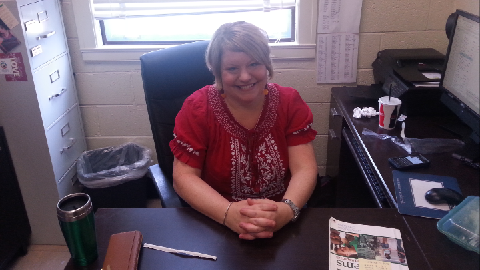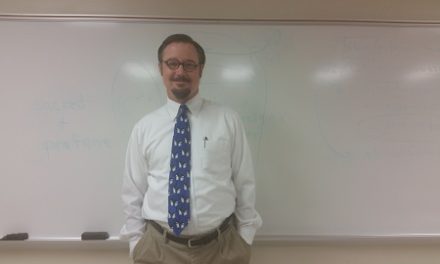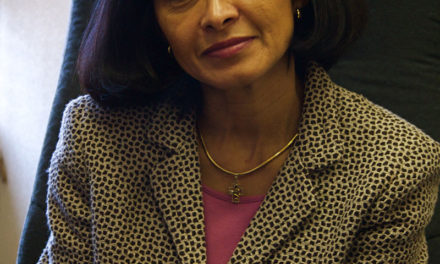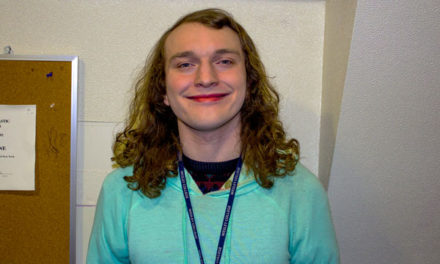During Dr. Jessica James’ senior year of high school in Monroe, La., she was secretary of the school’s business-oriented club DECA. For a fundraiser, the club sold surveys that determined dating compatibility among students.
The school’s principal said he wouldn’t approve it.
“He called me into his office and told me I couldn’t hand them out because there was no question about race,†James remembered.
“He said ‘We can’t be matching white and black students.’ That was one of the first times that I really felt like it was unjust. I can remember crying while I added questions to all the surveys.â€
James, an associate professor of sociology and the head of the Africana Studies minor program at Wesley, is also the advisor for Black Student Union and the head of the Living Learning Community.
Inside her Malmberg apartment, the walls are decorated in African masks and pictures that she acquired on her various travels. She has a bookshelf full of African and African-American literature. Her Ghanaian plant-holder has an intricate design that is meant to symbolize unity within the community.
“I kind of like my decorations to mean something,†James said. “A lot of my decorations here and at my house in Philly were collected from traveling to Africa and Jamaica.â€
James didn’t always see herself entering the field of Africana. She thought she was going to major in psychology. Then she thought about political science.
“But I knew by the end of my freshman year I wanted to declare history,†she said. “I was looking through the course descriptions for my sophomore year and I saw, ‘African Rebellions.’ I was 19, and that sounded pretty cool.â€
After completing the course, she declared Africa and African Diaspora as her minor. She was impressed by her professor, who became her adviser and mentor.
“She taught me so much about not only African History, but also European history from a different perspective than anything I’d ever learned growing up in Monroe,†she said.
James’ upbringing  didn’t seem to point to her future career. The youngest of four children, James’ sportscaster father and office manager mother divorced when she was in third grade.
“It was hard,†James said. “My dad was the breadwinner in the family, and so once my parents divorced he had to send a certain amount of money to us every month.â€
The family struggled, but as older siblings moved out and her mother married again, things got better.
“It was really because of (my stepdad) that I was able to do a lot of things, like pledge Kappa Alpha Theta when I went off to college,†she said.
Growing up in the South, James saw firsthand some of the plights African-American students faced.
“I can remember my senior year on the first day of the DECA class my white teacher told the four or five black students they were in the wrong class and that they needed to go next door where the same class was being taught by a black teacher,†she said.
After graduating from Tulane as one of the first two students to complete the Africa and African Diaspora minor program, James worked in the New Orleans school district for two years before pursuing her masters and doctorate degrees at Temple University.
It was during this time that she met her husband, Wayne.
“I met his roommates first at Fairmount Park in Philly,†James said. “We were talking about Louisiana food and I offered to cook them shrimp creole. I was in their kitchen and this heavy metal dude with the long hair walked in. I was 24 and I thought he was super-duper hot. He was my kind of guy.â€
James and her husband have been married for 16 years, but haven’t had any children.
One of the reasons she didn’t have children is that at 28, she was diagnosed with cervical cancer.
“I was at Temple’s health clinic for my annual exam and they found two abnormal paps,†she said. “I had surgery that summer and I’ve been clear ever since.â€
She said she and her husband are still open to adoption.
James started working at Wesley in 2006, a year before she earned her doctorate. The College had no Africana Studies minor.
“I wrote up the proposal in the spring of 2012 for five new Africana courses,†James said.
James said the program has been successful so far.
“There had only been five Africana courses ever taught when I got here,†she said. “We’ve about tripled that number now. I think it’s important for all students to feel like they’re represented in both the curriculum and student life at their college, particularly African-American students at predominantly white institutions.â€
She said having a strong the Black Student Union is so important.
“A lot of African-American students at PWI’s have said in different studies that they feel that the environment at their school is hostile and not inclusive of them,†James said. “I brought that up in my proposal for the minor, too, so the program and the organization kind of go hand in hand.â€
Being BSU’s advisor has not always been easy for Dr. James, however.
“It’s definitely been challenging at times,†she said. “There are times I feel that we’re under more scrutiny than other organizations, especially when it comes to putting on events. It’s been like that since I started, but it definitely got worse after the ‘riot’ at BSU’s homecoming dance last year. After that our vice president had to meet with the dean almost every week just to get the Block Party to go through. I don’t know if other organizations have to go through the same things we do, but it definitely feels like a lot of unnecessary hoops.â€
Dr. James is passionate about her work with the Living Learning Community as well.
“I love making connections with the students,†James said. “And the program really helps students with their transition to college life.â€
Dr. James’ Africana Studies program has done so well that some professors have suggested that she pursue turning it into a major program. One of these professors is Dr. David Laganella, the head of Wesley’s music department who also teaches the Africana Studies’ History of Jazz and History of Rock & Roll courses.
“She seems like she genuinely cares about her students,†Laganella said. “And she certainly has the expertise to develop the upper level courses that would be part of a major. She may possibly want to hire someone else to join her on the faculty, because it would be a lot of work for one person.â€
While she says she would love to see the program grow, Dr. James feels that it may not be quite ready yet.
“Overall I think to turn it into a major, we would need more professors and more courses,†James said. “Honestly, I’m comfortable with the number of courses I’m teaching now for the minor and if I was to tackle more, I’d need some more help. But who knows? Maybe within the next couple of years we’ll be able to do it.â€





